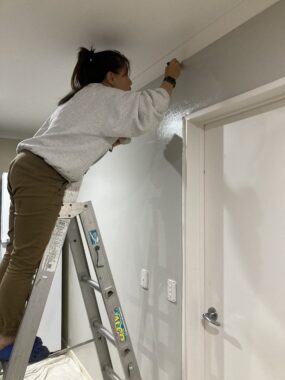Finding purpose helped me navigate grief after losing my husband
Tackling a home project proved cathartic for this columnist

It’s winter here in New Zealand. I woke up to a thin sheet of ice covering the deck, staying frozen just long enough to glint in the morning sun. That happens when moisture trapped in the air cools drastically and the temperature drops below freezing overnight.
Now that I live in a rural township south of Auckland, the open space and higher altitude mean it’s colder. It’s a beautiful region, and I’m embracing the transformation within me at this stage of my life.
My husband, Aubrey, passed away on May 22, 2022. He’d been diagnosed with hereditary ATTR amyloidosis in 2013. After I spent nine years as his caregiver and almost 27 years as his wife, his death left me at one of the most significant crossroads of my life.

Jaime Christmas filled a refuse bin while cleaning out her garage. (Photo by Jaime Christmas)
For the first time in my adult life, I was without an intimate companion. I’d lost my confidant, and every big decision sat squarely on my shoulders.
A friend advised me to allow time for grieving and to avoid making any substantial life decisions until later. That was wise, as sadness has a way of influencing the thought process. One minute, I felt strong; the next, my emotions got the better of me.
But however prudent waiting may be, grief has a knack for appearing when we least expect it. I don’t think there’s a timeline for when someone should start “living” again. It’s up to each of us to decide for ourselves.
Moving forward
A week after Aubrey passed away, I ordered a big refuse bin and set out to clean out the garage. I went through our family’s storage — everything Aubrey, our four children, and I had accumulated over the years.
The bin filled to the brim quicker than I’d anticipated. With every toss, I released my frustration about the unfairness of losing a spouse sooner than necessary. I let go of my anger about how our nation’s healthcare system let Aubrey down by not funding the lifesaving treatment he needed.

Jaime paints the garage. (Courtesy of Jaime Christmas)
That garage provided a safe space for me to let go. It was cathartic. Once I’d finished cleaning it out, I gave the walls a fresh coat of paint. It may sound banal, but walking the paint aisle to pick a color I wanted, going home, and flicking the paint onto the wall with a brush were incredibly therapeutic.
I made that decision all on my own, and after the garage was completed about three weeks later, I felt so much better. I looked around and, in that moment, realized I’d be fine on my own. I’m capable of moving on. Aubrey’s legacy lives on in me and my children. No matter what, life will carry on, and happiness can be found.
American philosopher and psychologist Abraham Maslow once said, “A musician must make music, an artist must paint, a poet must write, if he is to be ultimately at peace with himself. What a man can be, he must be.”
Finding purpose in whatever circumstances we face is crucial. Cleaning, painting, and carpeting the garage helped me get out of bed each day. Being a task-oriented person, I instinctively realized that unless I focused on an assignment, I’d delve deeper into the doldrums of sadness. Looking back, it was the best thing I could’ve done for myself.
Note: FAP News Today is strictly a news and information website about the disease. It does not provide medical advice, diagnosis, or treatment. This content is not intended to be a substitute for professional medical advice, diagnosis, or treatment. Always seek the advice of your physician or other qualified health provider with any questions you may have regarding a medical condition. Never disregard professional medical advice or delay in seeking it because of something you have read on this website. The opinions expressed in this column are not those of FAP News Today or its parent company, Bionews, and are intended to spark discussion about issues pertaining to familial amyloid polyneuropathy.







Leave a comment
Fill in the required fields to post. Your email address will not be published.